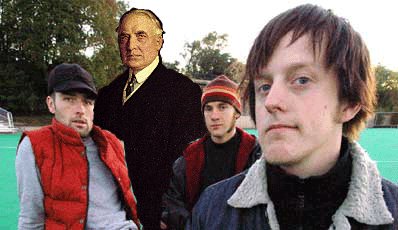Midwest Product and Warren Harding

I was browing iTunes when I saw that the band Midwest Product has a new EP out on Ghostly Records. If you're not familar with MP, they're synthy, comparable to New Order. I was introduced to them via a great live performace a number of years ago at The Temple Club in Lansing. I haven't heard the new EP yet, but the first song is called "Swamp (Warren Harding Memorial Version)." My first thought was, "Warren Harding? How do I know that name?"
So, of course I googled. I found the results hilarious, and worth sharing. If you knew the name Warren Harding, you paid more attention in class than I.
From the page at www.things.org:
HARDING, WARREN G. (1865-1923)
Warren Harding was the 29th president of the United States. He was inaugurated on March 4, 1921.
Harding's administration was riddled with scandals. The conduct of several of his cabinet members brought considerable criticism against the president and the Republican party.
The "Teapot Dome Affair" was perhaps the most important scandal of Harding's administration. After jurisdiction over naval oil reserves were transferred to the Department of the Interior, secretary Albert B. Fall leased Teapot Dome to oil interests in exchange for a bribe. He eventually spent time in a federal prison because of his actions. The incident also resulted in the resignation of Secretary of Navy Edwin N. Denby, who had consented to the transfer of the reserves.
Warren Harding was also the man in office when Prohibition went into effect in 1919. Now why would Midwest Product be thinking about Warren Harding at this time? Hmmmmmm.
Whitehouse.gov also has an interesting bio:
Harding's undeviating Republicanism and vibrant speaking voice, plus his willingness to let the machine bosses set policies, led him far in Ohio politics. . .
An Ohio admirer, Harry Daugherty, began to promote Harding for the 1920 Republican nomination because, he later explained, "He looked like a President.". . .
By 1923 the postwar depression seemed to be giving way to a new surge of prosperity, and newspapers hailed Harding as a wise statesman carrying out his campaign promise--"Less government in business and more business in government.". . .
Looking wan and depressed, Harding journeyed westward in the summer of 1923, taking with him his upright Secretary of Commerce, Herbert Hoover. "If you knew of a great scandal in our administration," he asked Hoover, "would you for the good of the country and the party expose it publicly or would you bury it?" Hoover urged publishing it, but Harding feared the political repercussions.
This all seems so familiar, but I just can't put my finger on it. . .

0 Comments:
Post a Comment
Subscribe to Post Comments [Atom]
<< Home